Olympiads and schools in Mathematics
VU MIF organises and contributes to the organisation of the following olympiads:
- Lithuanian Mathematics Team Olympiad (Professor Jonas Kubilius Cup)
- Mathematical Contest of Friendship in Honor and Memory of Grand Duchy of Lithuania
- Lithuanian Mathematics Olympiads for Grades 5-8
- The VU MIF Mathematics Olympiad
- The Lithuanian Mathematical Olympiad (LMO) Final Round
- LMO Regional Round
- International Mathematics Olympiad and Middle European Mathematical Olympiad Team Selection Test
- The MIF Student Mathematics Olympiad
- Regional olympiads:
- The Pasvalys Region Team Mathematics Olympiad (Professor Bronius Grigelionis Cup)
- The Raseiniai Region Olympiad (Professor Jonas Kubilius Cup)
- The Rietavas Team Mathematics Olympiad (Teacher Kazys Šikšnius Cup)
- The Alytus Region Team Mathematics Olympiad (Teacher Kazys Klimavičius Cup)
- The Sūduva Region Gymnasium Mathematics Olympiad
- The Širvintos Region Team Mathematics Contest (Teacher Antanas Kuliešius Cup)
- The International Mathematical Kangaroo
Olympiads and schools in Informatics
VU MIF organises and contributes to the organisation of the following olympiads:
- Lithuanian Schoolboys Informatics Olympiad
- European Youth Informatics Olympiad
- Preparation for the International Informatics Olympiads
- Central European Informatics Olympiad (guests in 2020)
- International Informatics Olympiads (represented by Prof. V. Dagienė)
- Baltic Informatics Olympiads
- Saturday School of Informatics Olympiads
The Lithuanian Young Mathematicians School
The Lithuanian Young Mathematicians School (LYMS) was reopened in 1998. Since then, 20 generations totalling 4488 students have graduated from the school. LYMS is a continuation of the Lithuanian Young Mathematicians Extramural School, which operated in 1969-1988. The curriculum of the Lithuanian Young Mathematicians School is extramural and lasts two years.
- Admission to LYMS takes place in September. Secondary school, 11th grade students, or students of respective gymnasium grades, are admitted if they submit solutions to the questions of the admission exam and achieve the required grade.
Bebras Challenge
Aim
The Bebras Challenge, an informatics (computer science or computing) and computational thinking contest, was established in Lithuania in 2004. The Challenge quickly became international, and more countries join the Challenge each year. There has been a worldwide increase in the demand for informatics engineers and information technology specialists who are capable of developing innovative and smart computer programmes and providing variety of intellectual services. This places a significant task upon education; the development of algorithmical, analytical, informational, logical, systematical, and processual cognition should start at primary school or even at kindergarten. This is exactly the aim of the Bebras Challenge. Tasks for the Challenge are created by all participant countries – about 300 tasks each year. This helps to incorporate various scientific schools and aims into the Challenge, and to form a vision of future developments in the field of informatics.
The Bebras Challenge has an impact not only on schools whose students participate in the Challenge and whose teachers discuss the tasks. As part of the development of the tasks, informatics and engineering teaching guidelines and the content taught are formed, and new platforms and systems are developed. The latter include systems for implementing interactive tasks, adapting contests to mobile devices and voice control, etc.
School students and teachers benefit the most from this project, as all schools and children of all ages (from 6 to 19) can participate. The Bebras Challenge is also very beneficial to education policy makers and researchers, who work together on methodology of informatics and computational thinking education. More than a hundred research papers are published in connection to Bebras Challenge (https://www.bebras.org/?q=publications). Thanks to this cooperation, a significant international community of informatics teachers and professors has formed. The ideas of this community also have an influence on the members of society who care about education. The Bebras challenge promotes problem solving skills and Informatics concepts including the ability to break down complex tasks into simpler components, algorithm design, pattern recognition, pattern generalisation and abstraction.
The aim of the Bebras Challenge is to show students and teachers the beauty of informatics, to get them involved, to introduce to them the basic notions of informatics and information technology, including their wider context, and to motivate them to study contemporary decision making methods in the fields of mathematics and engineering. Playful and accessibly formulated tasks include all fundamental areas of informatics and showcase their importance and relation to other fields of science. This is a challenging task. Presenting scientific problems and tasks in a popular way poses the risk of oversimplifying fundamental questions or distorting them. To avoid this, many informatics scientists and practitioners are involved in the development of tasks, and the tasks are discussed and analysed many times.
The idea of the Bebras Challenge
The idea of an informatics and computational thinking contest was born in 2003, when the author of these lines was travelling in Finland with informatics experts. The activity of beavers near lakes and rivers were discovered. The beaver is a determined animal that successfully builds dams in fast flowing rivers and works hard to achieve its goals. The results of beaver labour can be seen in many rivers and creeks in Lithuania. It seems as if the beavers compete which of them will fell the most trees and build the most dams.
In comparison, the Mathematical Kangaroo is a contest that Lithuanian schools have participated in for quite some time. Students solve mathematical tasks and puzzles for the context, while at the same time developing their thinking and imagination. Informatics educators had the idea to develop a similar contest in the field of informatics (computer science or computing). The Kangaroo Contests are now a yearly event in more than 70 countries. The Bebras Challenge is run in more than 60 countries each year.
Prof. Dr. Valentina Dagienė
Chief Researcher, Institute of Data Science and Digital Technologies, VU MIF
Chair, Organising Committee, the Bebras Challenge
Click here to find out more about the Bebras Challenge.
